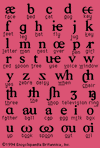相關網站
英語音位學辭典網站
《廣韻》中音位的頻率
輔音的種類有哪些
International
Phonetic (H.K.) Association
Sound Reading - The International Phonemic Alphabet
English language uses 44
phonemes or speech sounds to make up all words - spoken or written. Speech is
translated into print by assigning letter(s) to phonemes. Current research
clearly shows that knowing how to translate between phonemes and print is essential to reading and spelling.
Working from this research, we
developed the foundation for the Sound Reading auditory activities that promote
reading and spelling.
Alphabet o f 44 characters designed by Sir James Pitman to help children learn to
read English more effectively. The Initial Teaching Alphabet is based on the
phonemic (sound) system of English and uses the Roman alphabet, augmented by 14
additional characters, to represent each distinct sound with a separate symbol.
It evolved from the "phonotype" of Sir Isaac Pitman (grandfather of
Sir James) and the "Nue Speling" of the Simplified Spelling Society of
Great Britain. The Initial Teaching Alphabet adheres closely to traditional
orthography but contains lowercase characters only; it retains certain
conventions of English spelling, such as c and k to represent the same sound and
double consonants. The Initial Teaching Alphabet was adopted on an experimental
basis in some schools in England (beginning in 1960)
f 44 characters designed by Sir James Pitman to help children learn to
read English more effectively. The Initial Teaching Alphabet is based on the
phonemic (sound) system of English and uses the Roman alphabet, augmented by 14
additional characters, to represent each distinct sound with a separate symbol.
It evolved from the "phonotype" of Sir Isaac Pitman (grandfather of
Sir James) and the "Nue Speling" of the Simplified Spelling Society of
Great Britain. The Initial Teaching Alphabet adheres closely to traditional
orthography but contains lowercase characters only; it retains certain
conventions of English spelling, such as c and k to represent the same sound and
double consonants. The Initial Teaching Alphabet was adopted on an experimental
basis in some schools in England (beginning in 1960)
[回上一頁]
 f 44 characters designed by Sir James Pitman to help children learn to
read English more effectively. The Initial Teaching Alphabet is based on the
phonemic (sound) system of English and uses the Roman alphabet, augmented by 14
additional characters, to represent each distinct sound with a separate symbol.
It evolved from the "phonotype" of Sir Isaac Pitman (grandfather of
Sir James) and the "Nue Speling" of the Simplified Spelling Society of
Great Britain. The Initial Teaching Alphabet adheres closely to traditional
orthography but contains lowercase characters only; it retains certain
conventions of English spelling, such as c and k to represent the same sound and
double consonants. The Initial Teaching Alphabet was adopted on an experimental
basis in some schools in England (beginning in 1960)
f 44 characters designed by Sir James Pitman to help children learn to
read English more effectively. The Initial Teaching Alphabet is based on the
phonemic (sound) system of English and uses the Roman alphabet, augmented by 14
additional characters, to represent each distinct sound with a separate symbol.
It evolved from the "phonotype" of Sir Isaac Pitman (grandfather of
Sir James) and the "Nue Speling" of the Simplified Spelling Society of
Great Britain. The Initial Teaching Alphabet adheres closely to traditional
orthography but contains lowercase characters only; it retains certain
conventions of English spelling, such as c and k to represent the same sound and
double consonants. The Initial Teaching Alphabet was adopted on an experimental
basis in some schools in England (beginning in 1960)